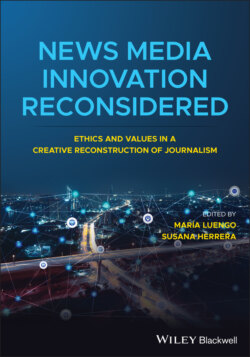Читать книгу News Media Innovation Reconsidered - Группа авторов - Страница 45
Notes
Оглавление1 1 See Singer, Participatory Journalism, Briggs, Entrepreneurial Journalism, and Batsell, Engaged Journalism.
2 2 An example of engaged, partisan journalism are the websites established by American conservative groups, such as the Franklin Center for Government and Public Integrity and the Sam Adams Foundation, to cover state legislatures from their libertarian, right-wing perspectives. See http://watchdog.org/about/and http://watchdog.org/category/illinois.
3 3 An example of civic engagement journalism is the Honolulu Civic Beat, a website established by Pierre Omidyar at www.civicbeat.org. In one series, “Home but not Homeless,” a Civic Beat reporter lived for months with a camp set up by poor citizens in an exclusive part of the city to focus attention the lack of proper housing.
4 4 Traditionally, in journalism ethics, neutrality has been regarded as part of the stance of objective reporting. Neutrality refers to the psychological attitude of not taking sides when reporting on conflicting groups. Objectivity is neutrality plus a strict reporting of just the facts, stripped of bias or interpretation. I chart the history of this notion of objectivity in Ward, Objectively Engaged Journalism.
5 5 One method is to use social media to “crowdsource” sources of revenue, such as asking individuals to donate to a series of stories. One form of engaged journalism, non-profit news organizations, may depend on funds from major philanthropic organizations who may be liberal or conservative in their political goals. For a successful nonprofit news organization, see the Wisconsin Center for Investigative Journalism at https://www.wisconsinwatch.org.
6 6 For list of awards won by the Civic Beat, see https://www.civilbeat.org/about/our-awards.
7 7 See https://www.raptim.org/20-international-human-rights-organizations.
8 8 For example, conferences on engaged journalism have been held at the Agora Journalism Center in the School of Journalism and Communication at the University of Oregon.
9 9 See https://medium.com/the-engaged-journalism-lab.
10 10 For example, the European Journalism Center hosts the Engaged Journalism Accelerator at https://www.engagedjournalism.com/Engaged. Journalism is a topic of discussion among members of the World Association for Newspapers and News Publishers, https://blog.wan-ifra.org/2019/01/25/engaged-journalism-why-newsrooms-should-put-the-needs-of-their-communities-first.
11 11 https://www.americanpressinstitute.org/publications/reports/strategy-studies/what-is-engagement.
12 12 Ward, The Invention of Journalism Ethics, Chapter 4.
13 13 Ward, The Invention of Journalism Ethics, Chapter 7.
14 14 Objectivity was at its zenith among the mainstream media of North America between the 1920s and 1960s, and fell gradually out of favor among journalists. From its beginning, the ideal always had its critics, such as the non-neutral magazine muckrakers, Henry Luce’s interpretive Time magazine, and the activist journalists who covered the American civil rights movement. Mark Hampton has argued that as American journalists were developing the ideal of objectivity in the news, British journalists were resisting the trend. See Hampton, “The ‘Objectivity’ Ideal and its Limitations in 20th-century British Journalism.” On muckrakers, see Filler, The Muckrakers; on Luce’s negative view of objectivity, see Baughman, Henry R. Luce and the Rise of the American News Media, 25.
15 15 On the amount and nature of unreliable media, see Ghosh and Scott. “Digital Deceit,” and Fuchs, Digital Demagogue.
16 16 On the relationship between extreme opinion and democracy today, see Levitsky and Ziblatt, How Democracies Die, and Ward, Ethical Journalism in a Populist Age.
17 17 However, there was writing here and there that attempted to codify non-neutral journalism, such as MacDougall and Reid’s Interpretative Reporting, or ethical discussions around literary (or narrative) journalism, e.g., https://www.poynter.org/archive/2002/the-ethics-of-narrative-journalism-a-continuing-debate. As well, columnists explained their craft in articles, books, or public speeches, such as honoring the norm of being “independent from faction.” See Kovach and Rosenstiel, The Elements of Journalism, Chapter 5. But the amount and quality of serious ethical thinking on non-neutral journalism did not compare with the numerous, in-depth textbooks on professional and objective journalism across the twentieth century.
18 18 See, for example, Craig, Excellence in Online Journalism.
19 19 By a moral ideology I mean a view about the basic aims and principles of journalism—the point of the practice.
20 20 On the kinds of democracy, see Held, Models of Democracy.
21 21 Dewey, Democracy and Education, 16.
22 22 This preference for egalitarian, participatory democracy would need, to be fully persuasive, an extended argument. I provide a detailed conception in Ward, Global Journalism Ethics.
23 23 Rawls, Political Liberalism, 4.
24 24 Ward, The Invention of Journalism Ethics, Chapter 8.
25 25 Rawls, Political Liberalism, 54–58.
26 26 Mindich, Just the Facts: How “Objectivity” Came to Define American Journalism, 113–137.
27 27 Dewey, The Public and Its Problems, 3–8.
28 28 Quine, Pursuit of Truth, 96–102.
29 29 For a detailed analysis of this example, see Bell (with Andrea Cervantez), “News Coverage of Racism, White Supremacy & Hate Speech”.
30 30 I provide a list of types of anti-democratic activity that require the oppositional stance in Ethical Journalism in a Populist Age, 127–130.
31 31 For an example of new and good work on the emotions, see Wahl-Jorgensen, Emotion and Journalism.
32 32 Damasio, Descartes’ Error.
33 33 Morton, Emotion and Imagination, 24–26.
34 34 On the contribution of wonder to the progress of science, see Daston and Park’s Wonders and the Order of Nature.
35 35 Dr. Spock is a character from the TV science fiction series, Star Trek. The non-human Dr. Spock was baffled by humans who included emotions when making decisions.
36 36 Haack, Manifesto of a Passionate Moderate, 10.
37 37 I provide a number of indexes and guidelines in Ethical Journalism in a Populist Age.
